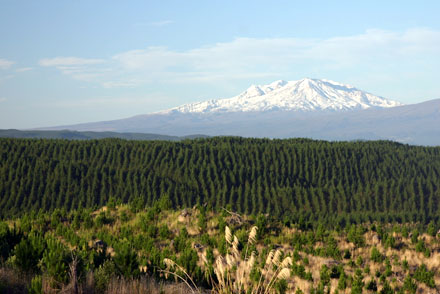
The land beneath about 22,500ha of Otago forestry blocks has been sold to a specialist Australian forestry investment fund for an undisclosed price, and the fund has also bought a 38% stake in Otago’s largest timber producer, Wenita Forest Products. Sources: The Australian, The New Zealand Herald, Stuff NZ
The land ownership has moved from a United States-owned fund to an Australian fund. The Overseas Investment Office this week granted consent for the sale of 22,553ha of land from overseas US fund, Fund 7 Foreign LLC, owned by Boston-based The Rohatyn Group, to Australian ANZFF2 NZ Ltd, a subsidiary of New Forests Australia Forest Fund 2, of Sydney.
The cutting and management rights both remain with Wenita Forest Products, which has had them since 1990, and the land area remains under its control.
Wenita chief executive David Cormack said when contacted he expected few changes under the Australian governance, for either Wenita’s 14 staff or more than 110 contractors it has involved in silviculture, harvesting, road building and transportation.
“It’s business as usual for us. We’re not expecting any major changes,” he said.
Wenita has blocks in Mt Allan, northwest of Dunedin, and a further 20 spread across Maungatua to Lawrence, and southwest down to Kaitangata and around Akatore, near the coast.
Industry sources understood the complex deal had been under negotiation for the past two years and the sale price was potentially “well over $100 million”, but that had not been confirmed.
The Australian fund invests in New Zealand, Australian, Asian and US forests, and has more than $3.5billion (NZ$3.81billion) of assets under management, the OIO’s June decisions statement said. Wenita Forest Products is the largest producer of timber in Otago and its revenue last year was $73.8million.
The Rohatyn Group partner Ian Jolly said in a statement on its website it had bought the Wenita shareholding in 2005, in a joint venture with Chinese logistics company Sinotrans, and 100% of the Otago Land Company’s land in 2006.
Part of the OIO consent includes retaining existing permitted land access, to evolve into unrestricted public access and also several conservation initiatives.
The decision said the “likelihood” was the logs would be available to domestic sawmillers.
Wenita already sells about 50% of its logs domestically.
Mr Cormack said Wenita’s policy was to offer most of its best logs to domestic customers first, and after their selections, the balance of logs went to export.
Aside from the 22,553ha of sensitive land in Otago, ANZFF2 NZ Ltd will also take a 38% share in Wenita Forests Products and will also make an unspecified loan to Wenita.
Wenita Forests Products has five directors, including one Dunedin-based, but its 62% shareholder remains Chinese company Sinotrans (NZ) Ltd, whose parent is Sinotrans & CSC Holdings Co, of Chaoyang district, Beijing, China.
Wenita still has a separate, freehold interest in 5830ha of land, including management and cutting rights. Sinotrans (NZ) Ltd’s accounts for trading year to last December said the harvest value in 2016 was $20.1million and rose to $26.2million in 2017.
The 2017 revenue rose to $73.8million, from $65.9million in 2016. Its after-tax profit last year was $29.2 million.
NZU carbon credit sales last year were $2.98million.
The OIO said in granting consent there would be an “identifiable benefit” to New Zealand. More trees would be pruned to improve wood quality and supply to local sawmillers would continue.
The Australian fund had committed to protecting ”significant areas” of native vegetation, wetland and native fish habitats, pest control programs and to preventing the spread of wilding conifers.
Wenita operates a permit system for access to its blocks, covering activities including hunting, mountain biking, motor cycling, horse riding and tramping.
In a separate forestry offering, the Rohatyn Group put up eight freehold forests for sale, called the Clutha Forest Estate, mainly southwest of Dunedin, and totalling almost 3000ha of mainly radiata pine with smaller areas of Douglas fir and macrocarpa.





